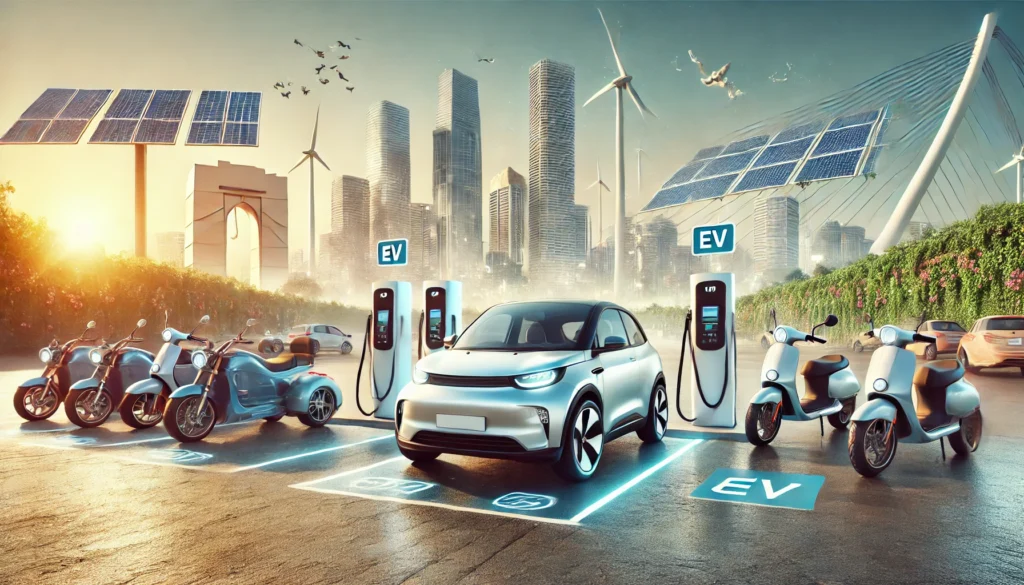India stands at the crossroads in transitioning to sustainable mobility as electric vehicles are quickly gaining popularity owing to the increasing environmental issues and challenges and growing energy solutions. Electric vehicles came out as the next big thing in this cloudy time of highly costly fuel, elevated pollution, and the call for zero-carbon emissions for the companies that the track later along the traditional diesel modes. Initiatives by the government, for example, the FAME (Faster Adoption and Manufacturing of Hybrid and Electric Vehicles) scheme and state-level incentives, as well as the coming up of EV manufacturing companies, are the forces driving the green mobility movement in India. Nevertheless, there are still the obstacles that are related to the culture and the scarcity of charging points and standards impeding the progress of the electric vehicles sector in India even with such a renewed thrust.
Is India Ready for Electric Vehicles?
Though the country is showcasing its efforts in the electric vehicle transition, India has to meter out the construction of the infrastructure and related technology to enable a large-scale transformation of mobility. Provision of recharging hubs, which are expensive still, and also encumbrances like no knowledge of electric vehicles among Indian customers will delay the transition to the electric vehicle ecosystem. Additionally, the transition to electric vehicles also requires a comprehensive overhaul of the Indian transportation system with battery manufacturing investments and a movement away from fossil fuels to more environmentally friendly energy sources.
Among the biggest preoccupations is India’s readiness of power grids for EVs. The fact that electric vehicles decrease the pollutants being emitted into the air but at the same time are subject to environmental sustainability through the power generated to recharge them should not be ruled out. We need to phase out the coal-fired power plants from the energy mix and replace them with solutions like solar, wind, and hydroelectric ones in a growing proportion if the true net emission decrement is to become such that it is not a disappointment.
Disadvantages of Electric Vehicles in India
While EVs are often hailed as the future of transportation, they come with their own set of challenges:
- High Initial Cost: EVs are significantly more expensive than their petrol or diesel counterparts. Even with government subsidies, the upfront cost remains a major deterrent for middle-class buyers.
- Limited Charging Infrastructure: Unlike traditional fuel stations, public EV charging stations are scarce in India, making long-distance travel inconvenient for EV owners.
- Battery Issues & Range Anxiety: EVs in India still suffer from limited battery life and range, leading to concerns over their practicality for long-distance travel. Additionally, battery replacement costs remain high.
- Dependency on Imports: India still relies heavily on imported lithium-ion batteries, making EV production costly and vulnerable to supply chain disruptions.
- Electricity Source & Grid Readiness: A large portion of India’s electricity is generated from coal-based power plants, which offsets the environmental benefits of EVs. Additionally, frequent power outages in many regions pose challenges for reliable EV charging.
The Future of Electric Vehicles in India
Despite these challenges, India’s EV market is set for exponential growth. The government’s push for 100% electric mobility by 2030, advancements in battery technology, and increasing investments from automakers indicate a positive trajectory for EV adoption.
Key developments shaping India’s EV future include:
- Expansion of charging infrastructure: Companies like Tata Power, Indian Oil, and government agencies are setting up thousands of EV charging stations nationwide.
- Localized battery production: India is pushing for domestic battery manufacturing to reduce dependency on imports.
- Affordable EV models: Automakers like Tata Motors, Ola Electric, and Mahindra are working on cost-effective EV options for the Indian market.
- State-wise policy support: Many Indian states are offering EV subsidies, tax exemptions, and special incentives to accelerate adoption.
Conclusion: The Road Ahead for India’s EV Transition
India’s transition to electric mobility is essential for sustainability and energy security. While progress is evident, challenges like charging infrastructure, battery production, and renewable integration must be addressed. With strong policies, investments, and innovation, EVs can drive India towards a cleaner and greener future, reducing dependence on fossil fuels and positioning the country as a global leader in green transportation.


1 Comment
Pingback: Mahindra records 30,179 EV bookings worth ₹8,472 cr on Day 1